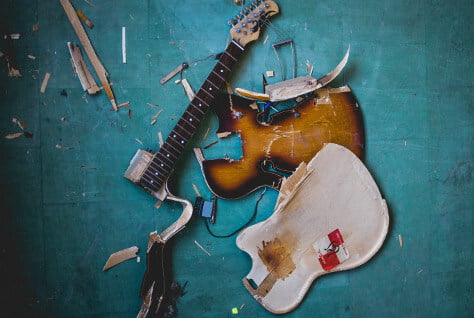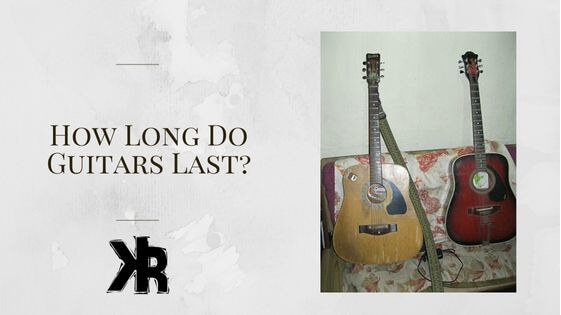Table of Contents
Just like most investments, putting money down on an instrument is not an easy thing to do. Not until you have weighed the pros and cons, anyway. Picking up a hobby like playing the guitar comes with some large initial purchases.
The biggest one is the instrument itself. We question many things while getting started. Like how long do guitars last? Will I get a good portion of my money back when I sell?
How Long Do Guitars Last?
As long as a guitar is made with quality wood and rigid construction, you can expect it to last up to 20 years on average. This is taking into consideration the different types of guitars. There are many price points available today, each with different levels of quality.
In this article, we are going to look at how long guitars last and what you can expect along the way. We will touch on a few of the more popular types and what you can do to help keep yours in great shape. There are things that will wear out and things that will not when treated right.
And so it’s best to know all this in order to make yours last as long as possible. Like putting stickers on your guitar. You will want to consider this heavily!
Electric Guitar Lifespan
The solid body electric type is probably one of the most mistreated of instruments. For the last few decades, the guitar has been beaten and smashed around like nobody’s business. All in the name of rock! Now, if this isn’t going to be the way you will treat your electric guitar, then you are off to a good start already.
The bulk of the guitar is normally made of wood and is what will make or break it. Depending on the wood type and construction, your model could last for a lifetime and then some. Some instruments are handed down from generations past. They continue to play brilliantly at present.
The electric guitar can last 100-plus years, depending on the wood type. Some of these types include:
- Ebony
- Maple
- Mahogany
- Rosewood
Even cheap models are made with mahogany and can last for a very long time when taken care of. There are even companies now producing solid-body electric guitars of composite materials. This will only allow them to last that much longer!
But wood isn’t the only material on an electric. We do have a few parts that will wear no matter how they are treated. Parts like strings, frets and mechanical apparatus will break down with use and age.
So there is some maintenance and upkeep involved. All in order to keep an electric guitar working for a lifetime.
But even these moving parts can be taken care of to get some longevity out of them. This does depend on their quality, however, so cheaper components will only last for so long. And so this can help answer the question, how long do guitars last?

Acoustic Guitar Lifespan
The acoustic type is quite a bit different from that of a solid body electric. While it can take a bit of a beating, it’s not like that of an electric! The acoustic guitar body is made from thinner materials. It’s braced strategically by the manufacturer. This bracing and wood choice help give it rigidity to deal with the string tension.
Like the electric guitar, an acoustic can be made with quality parts and construction. Or, on the other hand, cheaper material. Even cheaper materials can last a long time, but poor construction will end its lifespan.
An acoustic guitar that was made from quality wood and construction, can last up to fifty years! Sometimes many more years or even decades.
There are some things that an acoustic will require in order to be kept in good condition.
- Proper room temperature
- Proper humidity levels
- Store with low string tension
- Proper cleaning techniques
Keeping any type in a room with high heat and low humidity will shrink the wood. An acoustic, however, will be greatly affected! As the wood dries out, the guitar construction will be compromised. Acoustic models are assembled with glue and laminates to form the top, back, and sides.
As the guitar begins to dry out, it will eventually begin to fall apart. Now, this won’t happen right away. If you live in dry climates, especially in the winter, you need to prevent it from drying out every season. The combination of a heated, dry environment over a period of time is a killer.
You will also want to make sure the acoustic is stored with the steel string tension relieved. Leaving it sitting and tuned to standard will just add unnecessary force to the bridge. Eventually, it will come away from the body. Storing it with the steel strings loose will help prolong its existence.
Classical Guitar Lifespan
A classical guitar requires the same treatment that an acoustic does. While the classical guitar uses nylon strings, it’s constructed to be even less rigid. If you have ever held a classical, you would know just how light they are.
And because they use nylon strings, the body doesn’t need to be braced like that of an acoustic that uses steel. This is because nylon strings don’t have to be as tense as steel.
The body is made of thin material as well, so proper storage and care is needed to keep a classical model around. A classical guitar can last 50 to 100 years if treated well and made from quality materials.
But just like the electric guitar, an acoustic will require maintenance. All 3 of the types we have touched on have parts that will wear out by design and will need to be replaced.
Frets, strings, tuning head assemblies, and bridge parts will eventually need replacement.
Can A Guitar Wear Out?
For some, a lack of maintenance and rough treatment can mean the end. Cheaper models can last a very long time. But because they are cheap, they are usually not treated well during their service life. Players will use them for gigs and rehearsing, typically throwing them around.
As we have already touched on, the guitar has parts that wear. This is just the price of playing the instrument. Just like the brakes in your car, they wear with use. Parts that you can expect to wear with time are:
- Frets
- Strings
- Bridge
- Nuts
- Tuning heads
If they are maintained and or replaced when they are worn, a guitar can continue to play well for decades. Even a cheap unit!
But when these parts are neglected, eventually the whole instrument can wear. Even to the point of being too far gone.
A guitar can wear out and be considered expired. Only once the body has been damaged and most parts have worn out or broken. At some point, a player will either part it out or sell it cheap. But it never has to get to that point. With proper maintenance and care, it can last for a very long time.
Do Guitars Get Better With Age?
Just like quality wine, do guitars get better with age? With as many types and models on the market, we know that some of them begin to sound better with age. But is it better or only different?
Acoustic and classical types will begin to sound different as they age. This is because the wood will change over time. Manufacturers dry it out before they use it to make guitars ahead of time. But the environments that an instrument will remain in will have an effect on it.
Some guitars will sound better as they age, while others will just sound different. Some woods will dry out and become harder, or sometimes more brittle. Others change shape slightly. They can dry out and they can absorb moisture. This all contributes to their sound over time.
Solid-body electric guitars, don’t change very much in sound. Unless they begin to have issues with their electronics.
One thing that we know for sure is that age also brings wear. So in some regards, the instrument will get better with age, but not all.
When should I Replace My Guitar?
A guitar that plays well and sounds good is a necessity for a player. Struggling to make a worn-out instrument work only leads to frustration. This can have a large impact on your inspiration to continue to improve as a player.
When a guitar player becomes frustrated with the hobby due to a worn-out instrument. Then you know it’s time to replace it.
You don’t want to keep trying to make it work when it’s only making it harder to progress in skill. And there are some great models that are very affordable in the market today.
It doesn’t make sense to go on playing a worn-out unit when there are more options than ever. So if you find yourself in this situation, make the move and replace it.
How Long Does a Fender Guitar Last?
If you are a guitar player, you know the name Fender. It’s almost even a household name. This is because they are pioneers in the industry and have made some amazing gear. Even today, you can find some original Fender instruments still in playable condition.
A Fender Guitar can last over 100 years if properly maintained and cared for. Even some of the cheaper versions that Fender makes. They are well-constructed and are made using quality materials.
While over time, some parts will wear and need to be replaced. If you maintain it and treat it well, you could end up keeping it in playable condition for a lifetime.
Conclusion
Even if your current guitar is showing signs of wear and is maybe getting hard to play. That doesn’t mean it is finished! Some just need a bit of work and some new parts and can be wonderful to play once again. You can even have them repainted or finished, making them look great again, too.
Relic guitars have also been quite popular. So if you have one in need of some love, it might well be worth the money to revive it! So how long do guitars last? Well, that is up to you! Take care of your instrument, and you might get a lifetime.
FAQs
How long do cheap guitars last?
Just because a guitar might be cheap, doesn’t mean it will wear out faster. If you take good care of your guitar and have it maintained regularly, it can last from 10 to 20 years. This also depends on how much it gets used and the kind of treatment.
If it gets gigged and tossed around a lot, this might have a negative impact on its lifespan. But if the parts are easy to change, it is possible to keep it going for a long time.
Can a guitar last forever?
A guitar that doesn’t get much use and is stored correctly, can last forever. This depends heavily on how it’s cared for. Most vintage and collector guitars are many decades old and in great shape. They don’t get played much and are more for show.
If you have a guitar that gets heavy use, then it probably won’t last forever. But if you maintain it well, it can last many decades.

